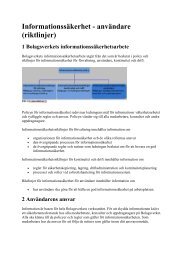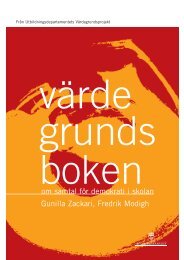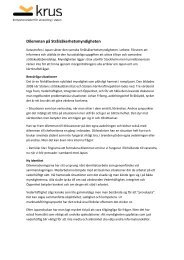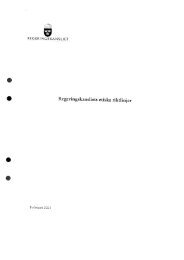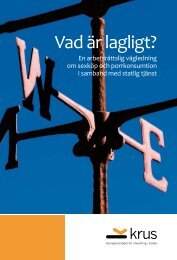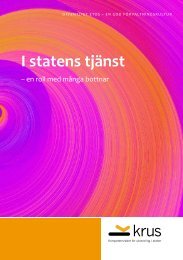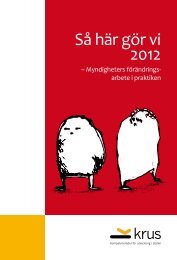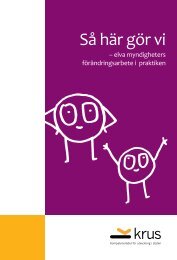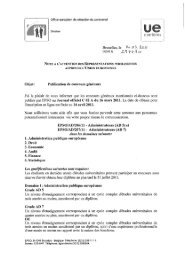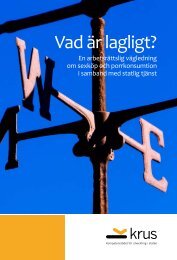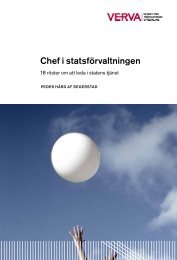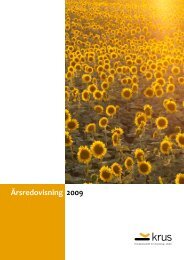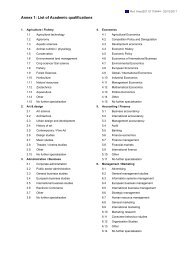Dialogkompetens i skolans vardag - Publikationer - LTU - Luleå ...
Dialogkompetens i skolans vardag - Publikationer - LTU - Luleå ...
Dialogkompetens i skolans vardag - Publikationer - LTU - Luleå ...
Create successful ePaper yourself
Turn your PDF publications into a flip-book with our unique Google optimized e-Paper software.
564 A.-C. Wennergren and K. Rönnerman<br />
voices heard, which can be considered to be something of an asymmetric situation.<br />
On the other hand, as Greenwood and Levin (1998) point out, in a social process<br />
grounded on democratic values it is necessary to encourage participants to realise that<br />
they have a valuable store of knowledge (e.g. by giving voice to that which, locally, is<br />
unspoken).<br />
In a ZPD arena comprised of a group of critical friends (6–10 people), it might be<br />
complicated to achieve an atmosphere that, at the same time, emphasises trust and<br />
encourages criticism. In our case, not all members in the web dialogue were active<br />
recipients or active in presenting challenges in the ZPD. A passive member on the<br />
Web could, at the same time, be an active member in the facilitating sessions. This<br />
might be a question of making an active choice in preferring either a written or verbal<br />
tool. Learning potential, according to Dysthe (1993), involves the systematic use of<br />
language in interaction between written or verbal activities. It seems that some people<br />
are ‘verbal’ and some people are ‘writing’ thinkers.<br />
The group perspective also indicates that the power of many voices may emanate<br />
from the differing cultures at the five schools and the university. The cross-school<br />
concept seems to bridge the paradox identified by Wenger (1998b, p. 8) that ‘no<br />
community can fully design the learning of another; but conversely no community can<br />
fully design its own learning’. A special educational setting can become highly focused<br />
in questions about the specific context. However, as in this case, members in a group<br />
with different experiences were much more open up to more general questions. Irrespective<br />
of the content, the use of a multi-voiced tool illuminates differences between<br />
voices, and thus constitutes an enhanced learning potential. Development always<br />
involves stimulating meetings between different voices (Bakthin, 1981; Dysthe, 1993).<br />
As we see it, the greatest challenge for the facilitator is not only to make every voice<br />
heard, but also to support each participant in being an active recipient. At the same<br />
time, an important task is to clarify that the visualisation of varying, and contextually<br />
different practices can be valid in everybody’s practice. Thus, the role of the facilitator<br />
may be rather complicated, since she/he is perceived both as a friend but also as someone<br />
who is critical, not only of individuals, but also of school cultures. This might be<br />
a reason why an outsider is better equipped for initially taking on the role of the critic.<br />
According to Greenwood and Levin’s (1998) definition, the outsider must be a risktaker<br />
and someone who can coach participants to be talented players. However, the<br />
actors participating in the ZPD are the more permanent colleagues and not a temporary<br />
scaffolding recourse, such as the facilitator.<br />
Bonk and King (1998) believe that Vygotsky himself would be both amazed and<br />
confused to witness the emergence of computer learning tools that have been justified<br />
by reference to his theories. Our experiences in this study, from the perspective of<br />
sociocultural theories, reveal difficulties with combined social interaction patterns<br />
and learner-centred ideas in a web dialogue. One the other hand, using computers for<br />
collaborative writing related to professional development might provide a compass for<br />
future directions of use. We therefore hope to continue to work in extending experiences<br />
about the learning potential of web dialogues as a part of scaffolding in school<br />
improvement processes.



